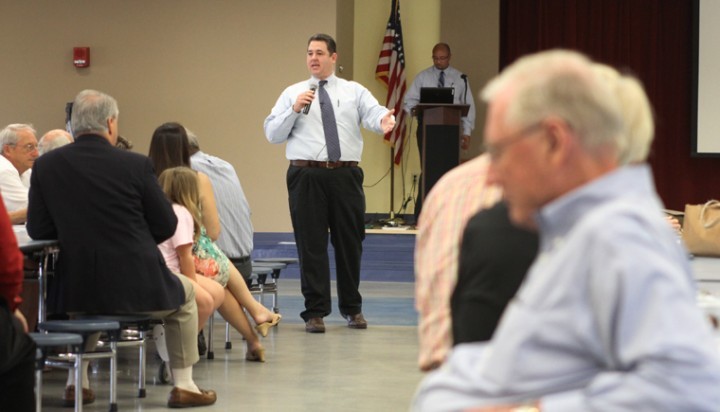
INDIAN RIVER COUNTY — Members of the Indian River County School District could be retooling their message about the upcoming property tax ballot referendum following Thursday night’s town hall meeting, during which members of the public, including those from the Indian River Tea Party and Taxpayers Association of Indian River County questioned the logic behind asking residents to continue to pony up more funds.
Indian River Tea Party member Chuck Mechling questioned the way the district is framing the ballot question – a “continuance” of extra tax. He pointed out that the two taxes the district is trying to replace would otherwise be gone on June 30, 2013.
The School District is asking voters to approve a 0.60-mill “essential operating needs” millage referendum on the ballot for the Aug. 14 Primary election. The 0.60 mills would replace the 0.35-mill bond referendum voters approved in 1990 and the 0.25-mill “critical needs” referendum voters approved in 2010.
“They’re not gone yet,” Assistant Superintendent of Finance Carter Morrison said of the two millage referenda – defending the use of “continue.”
He said the district is trying to structure a millage referendum that would be “millage neutral” – not more or less than what taxpayers are currently paying.
“We’re not asking for more than what we need,” Morrison said.
Mark Mucher, of the Indian River Taxpayers Association, questioned the 4-year term of the proposed millage rate when taxpayers were asked in 2010 to approve a 2-year term.
Morrison explained that the 2-year term had been repealed recently in the legislature, leaving the district with the only option of four years.
The School District is looking for a way to help cover unfunded and underfunded mandates that come from both the state and federal levels.
One such mandate requires the district to provide at least 50 percent of its curricula material in digital format, which means not only buying e-textbooks and other digital material, but the digital devices and technical support needed to make the digital files work in classrooms.
“You’ve got to have a device,” said Executive Director of Information Technology Bruce Green. “There’s no financial support.”
Another mandate requires the district to upgrade its core computer systems that handle, among many other things, teacher performance tracking and student information.
“It’s not just snap your fingers and it’s done,” Green said, explaining that the software the district is running was written in the 1970s and that many of the programs the district uses to handle the business side of the office will need to communicate with one another, something they don’t currently do.
County Commission Dist. 3 candidate Tim Zorc asked if it would be possible to discontinue the referendum before the 4-year term were over in the event the economy improved and tax values increased, generating the $32.7 million needed ahead of schedule.
Morrison said he did not know if that would be possible but would look into it.
Others from the Tea Party and Taxpayers Association posed questions regarding the district’s policies on sick and vacation time payouts, the possibility of a health clinic for employees, and the plans for building new wings at various elementary schools. The questions were meant to vet the School District to determine if the district was doing what it could to cut costs elsewhere before going back to voters for more money.
The School District told the audience that the money generated from the 0.60-mill referendum would not be used for construction, nor would it be used on the proposed health clinic, or to pay out sick and vacation time.
The funds, instead, would be used to purchase those items needed for the digital curricula mandate, preserve 31 teaching positions that would otherwise be cut once the 0.25-mill critical needs referendum expires, purchase new textbooks, refresh hundreds of computers and other technological devices including servers, and upgrade the computer system.
Charter schools, too, would receive a portion of funds generated from the referendum, as they received when voters approved the 0.25-mill referendum.
Schools Superintendent Dr. Fran Adams told the audience that the district has cut approximately $36 million and nearly 300 positions over the last few years due to steep decreases in property taxes.
“That’s severe,” she said, adding that the district has also closed a school, shifting its population to other schools and has relocated another school to that location rather than building a brand new campus for it. “We have got to watch every dollar.”
Former School Board member Charles Searcy asked if the district has a Plan B in place in the event the voters don’t support the referendum.
Dr. Adams said they don’t have a specific plan but have identified areas where deep cuts would have to be made to free up the funds needed to handle the upcoming state mandates.
After the town hall meeting, Dr. Adams said she was happy with the crowd that attended because they brought many questions.
“We want to know that the questions are (out in the public),” she said, adding that way the district can be sure to address and answer them. “Those groups have tough questions.”
She said given the tone and line of questioning, the district will need to put more focus on how the funds will directly benefit the students.



